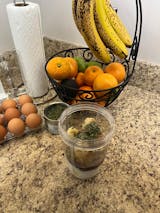A study published in The National Center for Biotechnology Information (NCBI) looked into over 200 studies about the effects of curcumin on diabetes. The ultimate conclusion of all these papers showed that curcumin helps manage diabetes in many different ways. The following are some of the health benefits of turmeric tea and curcumin for diabetic patients.
Insulin resistance
Insulin resistance happens when your cells do not respond properly to the hormone insulin. The body uses insulin to convert sugar into energy. With insulin resistance, blood sugar levels go up over time. This leads to the development of Type 2 Diabetes.
Curcumin has been shown to improve insulin resistance, reducing the chance for diabetes.
Diabetic Vascular Disease
Too much glucose in the blood can damage the blood vessels putting people with diabetes at a higher risk. Curcumin’s ability to improve blood vessel function as mentioned in previous sections, help to minimize this type of damage.
Diabetic Nephropathy
This is kidney damage caused by diabetes. High glucose levels can hinder the kidney’s ability to filter toxins which leads to kidney failure. Curcumin has been shown to help improve kidney function and reduce stress on the kidneys.









